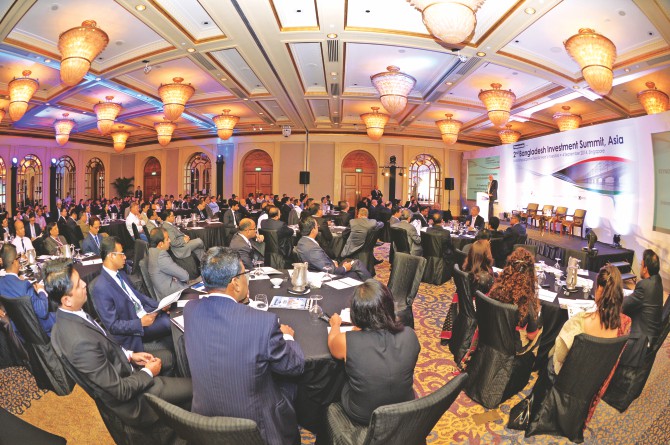
Last month, Standard Chartered Bank and City Bank organised a daylong conference to promote the investment case for Bangladesh on the world stage. Titled the Bangladesh Investment Summit, it was attended by representatives from prominent global financial firms, and The Daily Star was the media partner of the event. This is the third time that the two banks have joined hands for the cause, a brainchild of SCB. Previous editions of the summit were held in Singapore and London in 2012 and 2013 respectively.
Aristotle maintained that women have fewer teeth than men; although he was twice married, it never occurred to him to verify this statement by examining his wives’ mouths. The essence of this anecdote could very well be applied to the perception of Bangladesh beyond its national borders.
Upon its birth in 1971, American diplomat Henry Kissinger branded it the “basket case” of South Asia and that reputation more or less seems to have preceded Bangladesh — even to this date.
It is this misconception that the country’s policymakers, businessmen and well-wishers set out to clear at the second Bangladesh Investment Summit, Asia held at Four Seasons Hotel in Singapore on September 4.
“Not that these perceptions were not true, it is that the perceptions have not kept up with the changing scenes in Bangladesh,” Gowher Rizvi, prime minister’s foreign affairs adviser, said in his keynote speech.
He cited the agricultural advances the country has made in the past 42 years as a case in point.
In 1971, Bangladesh had a population of 70 million and was perennially short of food, according to the historian. “Our agriculture could not cope with 70 million people.”
Four decades later, with the population scaling 160 million, there is no shortage of food. Not only that, this fiscal year the country is set to make its maiden large-scale food export — some 50,000 tonnes of rice to Sri Lanka.
“This agriculture revolution has not happened because of five successful monsoons but is based on solid research, improvised seeds and scientific farming. Our farmers have shown how adept they are in accepting innovations.”
Rizvi, who taught at famed institutions like the Harvard Kennedy School and Oxford University, also brought up the solid growth figures the country has been registering, particularly emphasising those of the past five years.
Growth has averaged 6.2 percent the past five years, which Radhika Kak, South Asia economist at Standard Chartered Bank, said is high compared to the average of South Asian economies and other low-income economies.
“So, broadly speaking, it is fair to say that Bangladesh has been a relative outperformer in terms of growth.”
But to talk about economics only misses the real progress the country has made — and that lies in the social sector. “If you look at the social indicators, in every respect Bangladesh has done well,” Rizvi said.
This proclamation was corroborated by Johannes Zutt, country director of World Bank, who went on to add that the country has overtaken India “by a considerable margin” in many key development indicators since 1971 despite the fact that its income level is significantly lower than India’s.
“If we had been sitting in a meeting like this around independence and looking forward to 2014, would we have dared to predict that Bangladesh would do as well as it has done? My supposition is that we probably would not have.”
He particularly highlighted the pace of GDP growth in the past three decades, which is about 1 percentage point per decade. “It’s something very few countries have managed — hat’s a remarkable achievement.”
Remarkable, he said, as the country faced serious economic challenges and complications during the period — that one would have expected to knock back GDP quite badly or at least make it volatile.
“But what we see instead is a very strong and steady improvement in GDP year over year,” he said, while particularly praising the macroeconomic management, across both the BNP and Awami League governments.
This strong GDP growth has had two by-products: an equally consistent reduction in poverty rate and a rising middle and affluent class.
Today, there are 15 million or more Bangladeshis who earn $10,000 a year, which is twice the number as in Malaysia, according to Zarif Munir, a partner at Boston Consulting Group.
And Zutt says the solid poverty reduction should not be taken for granted. “I have worked in countries that have had increasing GDP growth but a flat line when it comes to poverty reduction — this is a commendable achievement.”
Corruption is another matter that seems to saddle Bangladesh’s image. After all, for five straight years, from 2001 through to 2005, it did top the Berlin-based anti-corruption watchdog Transparency International’s index for the world’s most corrupt countries.
“But as is often the case for Bangladesh, perception has not kept up with reality,” Rizvi said. For the past six years, let alone topping the list of most corrupt, Bangladesh did not come anywhere near the top 20.
In other words, corruption today is far less than it was, but like everything else, efforts are being made to change the scenario for the better.
Mahfuz Anam, editor and publisher of The Daily Star, endorsed Rizvi, adding that the country’s bad patch is behind it — and that it is now well and truly in business.
“And, after this conference, you will want to do business with us for business reasons — and not for philanthropic or altruistic reasons.”
Source: The Daily Star

